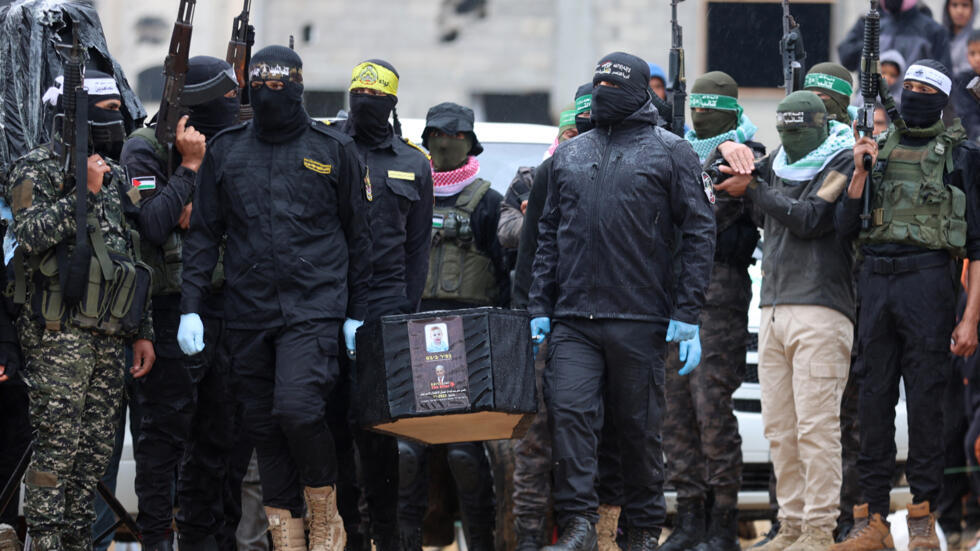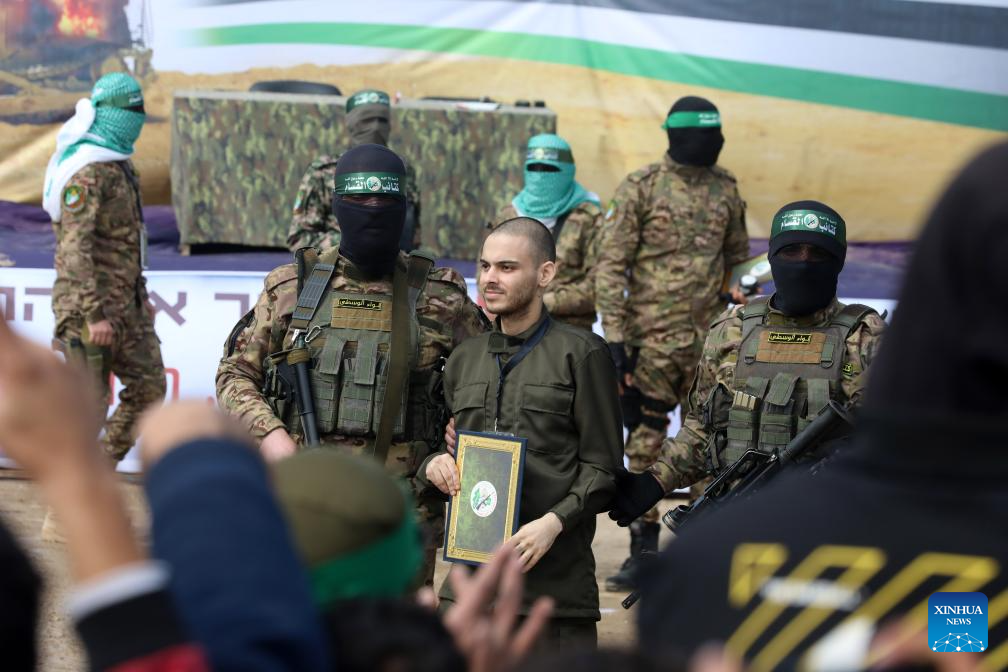The remains of two young children, their mother, and an elderly man taken hostage by Hamas have been returned to Israel in what onlookers described as one of the “hardest days” for Israelis since the Palestinian militant group attack that ignited the war in Gaza.
A convoy carrying the bodies of Shiri Bibas, 32, her sons Ariel and Kfir, four years and nine months old respectively, and 85-year-old Oded Lifshitz, all from the Nir Oz kibbutz, arrived at a forensics centre in Tel Aviv on Thursday for DNA checks and autopsy procedures.
Armed Hamas militants wearing black and camouflage placed four black coffins on a stage in a cemetery in the southern Gaza city of Khan Younis before giving them to the International Committee of the Red Cross (ICRC) amid growing international criticism of the group’s highly choreographed handover ceremonies.
The ICRC, which is mandated to maintain impartiality, issued an unusual statement after the bodies were returned to Israel, saying that the transfer should not have been public.
“These operations should be done privately out of the utmost respect for the deceased and for those left grieving. We have been unequivocal: every release – whether of the living or the deceased – must be conducted with dignity and privacy,” the organisation said. The United Nations also slammed what it called the “abhorrent and cruel” staging of the event, which it said “flies in the face of international law”.
The Israeli army held a ceremony attended by a rabbi upon receiving the bodies, and then transferred them to caskets draped in the Israeli flag before they were driven to Tel Aviv.
The transfer of the four bodies marks the first release of bodies in the fragile month-old ceasefire agreement between Israel and Hamas. In its first stage, which expires in early March, 33 living and dead Israeli hostages are supposed to be exchanged for nearly 2,000 Palestinian prisoners and detainees.
Bibas and her children – who Hamas claims were killed in an Israeli airstrike in the early days of the war – became an indelible symbol of the attack of 7 October 2023. Without Israeli confirmation of their deaths, relatives clung to hope, marking Kfir’s first and second birthdays and his brother’s fifth. Shiri Bibas’s parents were killed in the Hamas offensive, and her husband, Yarden, was taken captive and released earlier this month.
Lifshitz, a peace activist and retired journalist, had not previously been confirmed as dead. His wife, Yocheved Lifshitz, was released by Hamas in November 2023.
The sombre mood across Israel on Thursday contrasted with the sense of joy and relief that has accompanied the recent return of living hostages.
Israelis lined the road in the rain near the Gaza border to pay their respects as the convoy carrying the coffins drove by. In Tel Aviv, people gathered, some weeping, at what has come to be known as Hostages Square outside Israel’s defence headquarters.
“This is one of the hardest days, I think, since 7 October,” said a museum manager, Tania Coen Uzzielli, 59, who had gathered in the square with about 100 others. “I think the feeling of personal guilt is something each of us carries – that maybe we could have done more, that maybe we didn’t do enough to prevent this tragedy.”
In a statement, Israel’s president, Isaac Herzog, said: “The hearts of an entire nation lie in tatters.”
“On behalf of the state of Israel, I bow my head and ask for forgiveness. Forgiveness for not protecting you on that terrible day. Forgiveness for not bringing you home safely,” he said.
Lifshitz’s son, Yizhar, told Israel’s Army Radio: “The release of my father … is part of the terrible tragedy of those who went in alive and were murdered inside. To the people who prayed for my father and wanted a different end [I say]: continue. There are still a lot of living people inside whom we need to pray and work for.”
Hamas has said it will release six living hostages on Saturday, and another four bodies next Thursday, speeding up the conclusion of the first stage of the truce. Amid fears over the ceasefire’s future after a near-collapse last week, the Palestinian group said on Wednesday it was ready to release all of the remaining hostages in a single exchange if the truce agreement moved forward to a second phase next month.
The offer came as the Israeli prime minister, Benjamin Netanyahu, signalled his readiness to talk about a second phase of the Gaza ceasefire after an extended delay, by appointing one of his closest advisers, Ron Dermer, a US-born cabinet minister and former ambassador to Washington, to lead the Israeli delegation to the talks.
Netanyahu has long resisted any talk about the second phase of the agreement, which would involve a complete military withdrawal from Gaza and effectively end the war. Much of his far-right coalition government adamantly opposes such a step if it leaves Hamas as a significant force inside the strip.
About 48,000 people have been killed in Israel’s war in Gaza, which has caused a devastating humanitarian crisis and levelled much of the territory to rubble. About 1,200 people were killed in the 7 October attack, and 250 taken hostage.
We are bringing you Ghana, global contents and international news on our main (Futball Surgery) site as we work to restore Futball Surgery News website.
Understanding our network’s setup
Futball Surgery is the parent outlet
Futball Surgery News, is a subset, for news coverage (which we are working to restore website).
Futball Surgery Sports, is a subset, for sports coverage (https://futballsurgerysports.com).









